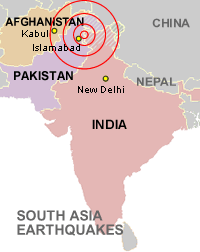A major earthquake measuring 7.6 on the Richter Scale occurred around 1.50pm Australian Eastern Standard Time on Saturday 8 October, affecting Pakistan, Afghanistan and India.
It was followed by numerous smaller quakes measuring up to 6.2 on the Richter Scale. The epicentre was approximately 100 kilometres north of Pakistan's capital Islamabad.
The Government of Pakistan says more than 73,000 people have been killed, more than 69,000 injured and 3.3 million are homeless - many still in desperate need of emergency shelter.
Australian Government assistance
Australia has committed a further $50 million to help victims of the earthquake in Pakistan survive the winter and reconstruct communities in the longer term.
This new funding, to be delivered through AusAID, will address the health impacts of the disaster and provide emergency and transitional shelter, including schools.
This funding will include $10 million in fresh emergency relief to assist multilateral organizations working on the ground including the International Organization for Migration, UNICEF, and the Red Cross.
The new Australian funding will also include a $40 million contribution to the reconstruction effort with a focus on rebuilding schools and other educational facilities, as well as health facilities.
Some of the funding will support the reconstruction programs of the multilateral development banks. Other funding will be channeled through a new Reconstruction Facility which will be established to help source Australian professional expertise such as engineers, urban planners and architects to respond to urgent and emerging reconstruction needs. Australian volunteers will have an integral role in the reconstruction effort.
In addition the Australian Defence Force has deployed a medical team to the earthquake zone around Muzaffarabad to provide essential primary health care services.
These contributions follow Australia's two-week Critical Infrastructure Assessment Mission which provided valuable engineering assessment and advice to the Pakistan Government.
Prime Minister John Howard announced the additional assistance while visiting the area on 23 November.
Mr Howard also committed 500 new scholarships for students in Pakistan to study in Australia.
Over the next five years 200 Australian Development Scholarships will be offered through AusAID, for postgraduate study at Australian universities at Masters and PhD level.
Australia has sent a total of 7335 woolen blankets to Pakistan for immediate distribution to earthquake survivors as well as 330,000 water purification tablets and 1,080 vials of tetanus immunoglobulin sent at the end of October.
Australia is also sourcing a further 1,000 sleeping bags, 840 woolen blankets, additional supplies of tetanus immunoglobulin and vaccines. Australian logistics officers will also be deployed to support the UN response. The latest contributions are in response the UN's revised Flash Appeal.
Australia's total contribution for earthquake relief and reconstruction now stands at $84 million.
Australia has offered condolences to the families of the victims and is continuing to monitor the situation in Pakistan, Afghanistan and India.
There are no reports of Australian casualties.
Requests for assistance
The UN launched a major Flash Appeal on Tuesday 11 October. The Government of Pakistan has appealed for international help through diplomatic missions in Islamabad. Several UN agencies including WHO, UNICEF and WFP are assisting with the coordination of relief efforts in the affected areas. The Governments of India and Afghanistan have not requested international assistance.
What you can do
Relief workers on the ground in the affected areas are best placed to identify the needs of the victims of the earthquakes. The best way for Australians to assist is to make a cash donation to a reputable non government aid agency that is supporting relief operations. NGOs are listed on the Australian Council for International Development's website.
16 Jan 2006

